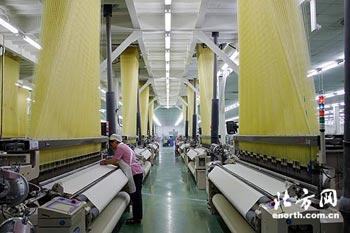Source: CCTV.com
02-05-2009 13:52
Experts believe the new plan to invigorate the textile industry will not only solve the short-term difficulties facing the sector, but also encourage innovation and branding to boost the the industry's future.
 |
| Experts believe the new plan to invigorate the textile industry will not only solve the short-term difficulties facing the sector, but also encourage innovation and branding to boost the the industry's future. |
China has raised the export tax rebate rate for textiles three times since last August. Experts believe the latest one percent hike is significant for exporters.
Wang Qianjin, Chief Editor of 1Fang.com said "A one percent hike in export tax rebates brings 4 billion yuan more in profits for the whole industry. The policy has a direct and quick influence. It is a big move."
Some experts say the national plan to invigorate the textile sector targets bottle-necks deep in the sector's development. At present, 80 percent of China's textile producers stay in the low end of the value chain. The relatively advanced chemical fibre products only account for 11 percent of the industry's total capacity.
Du Yuzhou, Chairman of China National Textile & Apparel Council said "Our industry takes the plan as a catalyst for building a competitive textile industry at the global market. Our goal is that China tops the world's textile industry by 2020."
Wei Jigang, Researcher of Development Research Center of State Council said "The government plans to restructure the whole industry as well as its employment structure. It is very positive for the textile and garment exports and for boosting the domestic consumption.
It is also believed the national plan to invigorate the textile industry will also help alleviate employment stress in the sector.
Du Yuzhou said "Two thirds of small and medium sized companies have been hardly hit by the global financial crisis. Their orders from big companies sharply drop as big one themselves also took beating from the crisis. 9 million people work in small and medium-sized companies."
China says about 20 million migrant workers have lost jobs and returned home. As a major employer of this group of people, the textile industry has become the new target of the government's economic bailout plan. It is believed that government support will help companies to bring migrant workers back the factories.
Click for more news in Biz China>>
Editor:Xiong Qu
